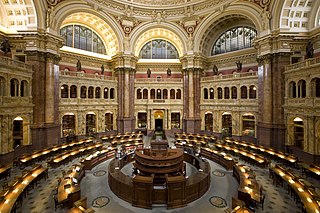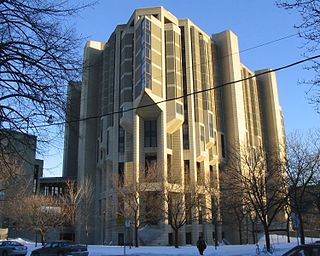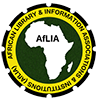
Ontario College of Art & Design University, commonly known as OCAD University or OCAD U, is a public art university in Toronto, Ontario, Canada. Its main campus is located within Toronto's Grange Park and Entertainment District neighbourhoods.

Open access (OA) is a set of principles and a range of practices through which nominally copyrightable publications are delivered to readers free of access charges or other barriers. With open access strictly defined, or libre open access, barriers to copying or reuse are also reduced or removed by applying an open license for copyright, which regulates post-publication uses of the work.

A research library is a library that contains an in-depth collection of material on one or several subjects. A research library will generally include an in-depth selection of materials on a particular topic or set of topics and contain primary sources as well as secondary sources. Research libraries are established to meet research needs and, as such, are stocked with authentic materials with quality content. Research libraries are typically attached to academic or research institutions that specialize in that topic and serve members of that institution. Large university libraries are considered research libraries, and often contain many specialized branch research libraries. The libraries provide research materials for students and staff of these organizations to use and can also publish and carry literature produced by these institutions and make them available to others. Research libraries could also be accessible to members of the public who wish to gain in-depth knowledge on that particular topic.
The Special Libraries Association (SLA) is an international professional association for library and information professionals working in business, government, law, finance, non-profit, and academic organizations and institutions.
An information professional or information specialist is someone who collects, records, organises, stores, preserves, retrieves, and disseminates printed or digital information. The service delivered to the client is known as an information service.
The Master of Library and Information Science (MLIS) is the master's degree that combines two interdisciplinary academic disciplines. Library science is applied information science and a subfield of information science. This degree focuses on information management. It is also the most common degree for professional librarian positions in the United States. The MLIS was created after the older Master of Library Science (MLS) was reformed to reflect the information science and technology needs of the field. According to the American Library Association (ALA), "ALA-accredited degrees have [had] various names such as Master of Information Studies, Master of Arts, Master of Librarianship, Master of Library and Information Studies, or Master of Science. The degree name has been determined by the program. The [ALA] Committee for Accreditation evaluates programs based on their adherence to the Standards for Accreditation of Master's Programs in Library and Information Science, not based on the name of the degree."
The California Digital Library (CDL) was founded by the University of California in 1997. Under the leadership of then UC President Richard C. Atkinson, the CDL's original mission was to forge a better system for scholarly information management and improved support for teaching and research. In collaboration with the ten University of California Libraries and other partners, CDL assembled one of the world's largest digital research libraries. CDL facilitates the licensing of online materials and develops shared services used throughout the UC system. Building on the foundations of the Melvyl Catalog, CDL has developed one of the largest online library catalogs in the country and works in partnership with the UC campuses to bring the treasures of California's libraries, museums, and cultural heritage organizations to the world. CDL continues to explore how services such as digital curation, scholarly publishing, archiving and preservation support research throughout the information lifecycle.

A school library is a library within a school where students, and frequently their parents, and staff of a public or private school have access to a variety of resources. The goal of a school library or media center is to ensure that all members of the school community have equitable access "to books and reading, to information, and to information technology". A school library or media center "uses all types of media. .. is automated, and utilizes the Internet [as well as books] for information gathering." School libraries are distinct from public libraries because they serve as "learner-oriented laboratories which support, extend, and individualize the school's curriculum... A school library serves as the center and coordinating agency for all material used in the school."

An academic library is a library that is attached to a higher education institution, which supports the curriculum and the research of the university faculty and students. According to the National Center for Education Statistics, there are an estimated 3,700 academic libraries in the United States. Class reading materials, intended to supplement lectures by the instructor and housed in academic libraries, have historically known as "reserves". Before electronic resources became available, the reserves were supplied as actual books or as photocopies of appropriate journal articles. Modern academic libraries provide access to electronic resources.

The Public Knowledge Project (PKP) is a non-profit research initiative that is focused on the importance of making the results of publicly funded research freely available through open access policies, and on developing strategies for making this possible. It is a partnership between the Faculty of Education at the University of British Columbia, the Canadian Centre for Studies in Publishing at Simon Fraser University, the University of Pittsburgh, Ontario Council of University Libraries, the California Digital Library and the School of Education at Stanford University. It seeks to improve the scholarly and public quality of academic research through the development of innovative online environments.

James G. Neal is an American librarian, library administrator, and a prominent figure in American and international library associations. In 2022, President Joe Biden appointed him to the National Museum and Library Services Board which advises the agency on general policies with respect to the duties, powers, and authority of the Institute of Museum and Library Services relating to museum, library, and information services, as well as the annual selection of the National Medal for Museum and Library Service.

The University of Toronto Libraries system is the largest academic library in Canada and is ranked third among peer institutions in North America, behind only Harvard and Yale. The system consists of 40 libraries located on University of Toronto's three university campuses: St. George, Mississauga and Scarborough. This array of college libraries, special collections, and specialized libraries and information centres supports the teaching and research requirements of 215 graduate programs, over 60 professional programs, and more than 700 undergraduate degree programs. In addition to more than 12 million print volumes in 341 languages, the library system currently provides access to 184,228 journal titles, millions of electronic resources in various forms and more than 33,000 linear metres of archival material. As of 2014, more than 150,000 new print volumes were acquired each year.
E-Science librarianship refers to a role for librarians in e-Science.
The Council on Library and Information Resources (CLIR) is an American independent, nonprofit organization. It works with libraries, cultural institutions, and higher learning communities on developing strategies to improve research, teaching, and learning environments. It is based in Alexandria, VA, United States. CLIR is supported primarily by annual dues from its over 180 sponsoring institutions and 190 DLF members, and by foundation grants and individual donations.
The Rhodes University Library is a library located in Makhanda, under the Makana municipality. It was initially established in 1937 in the Clock Tower building of Rhodes University College.

Open access (OA) to academic publications has seen extensive growth in Australia since the first open access university repository was established in 2001 and OA is a fundamental part of the scholarly publishing and research landscape in Australia. There are open access policies at the two major research funders: The National Health and Medical Research Council (NHMRC) and Australian Research Council (ARC) and around half of Australian Universities have an OA policy or statement. Open Access Australasia, the Council of Australian University Librarians (CAUL), and the Australian Library and Information Association (ALIA) are advocates for Open Access and related issues in Australia.

The African Library and Information Associations and Institutions (AfLIA), commonly referred to as AfLIA, is an international not-for-profit organization headquartered in Accra, Ghana. The Association is registered under the laws of Ghana as an NGO. It is managed under the general guidelines of its Constitution and by-laws.The Institution is currently being led by Dr. Helena Asamoah-Hassan as the Executive Director.

Helen Kay Raseroka is a librarian who was born in Kwazulu-Natal (Sudáfrica) with Botswana citizenship. She is a former President of The International Federation of Library Associations and Institutions (IFLA) from 2003 to 2005, under the theme "Libraries for lifelong literacy".

The Zimbabwe Library Association (ZimLA) is an association that represents library, records, archives and information professionals in Zimbabwe. Membership for those who wish to join the association is voluntary.

Professor Yetunde Abosede Zaid is a Nigerian librarian. She is the first Professor of Library and Information Sciences at the University of Lagos, and serves as the University Librarian.












